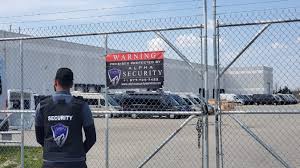When you run a factory, warehouse, or office building, safety and security are critical. The phrase Commercial And Industrial Sectors in the context of security means guarding not only your people, but also your machines, products, and property. Your workers, your tools, and your goods must stay safe from theft, damage, or vandalism. Good security also helps your staff feel confident as they go about daily tasks.
Why Industrial & Commercial Security Needs Are Unique?
Security needs in commercial and industrial settings differ from small shops or homes. In factories or warehouses, there may be large spaces, many entry and exit points, heavy machines, valuable inventory, and shifting operations. In offices and commercial buildings, you have staff, visitors, restricted zones, data rooms, and pedestrian flow. Because of these complexities, security must do more than just stand guard.
Security in industrial settings must often include protection for large outdoor areas, yards, loading docks, perimeter fencing, vehicle access, risk of machinery theft, and sometimes hazardous zones. Guards must know how to move in large spaces, often under low light, and respond to alarms from remote areas.
For commercial properties, security includes access control at doors, lobbies, visitor screening, monitoring elevators or stairwells, parking lots, and controlling who can reach sensitive zones like server rooms or vaults.
In both settings, surveillance systems like CCTV (closed-circuit television) play a big role. Cameras monitor blind spots, entrances, and perimeters. When something looks suspicious, security staff receive alerts and respond. Systems might include motion detectors, intrusion sensors, alarm systems, and remote monitoring.
Security also involves coordination your guard team must talk with your facility team, maintenance, management, and sometimes local authorities. When people search “industrial security Canada” or “commercial security services,” they expect to read that all these components work together smoothly.
How Security Is Planned & Deployed?
Security for commercial and industrial sectors is not just about placing guards. It’s planning first. A security firm will visit your site, walk every corner, see how people move, see potential weak spots, entry/exit points, blind zones, elevation changes, docks, windows, fences, and access gates. They check how vehicles come, when shifts change, and how goods flow in and out.
Then they make a plan: which areas need cameras, where alarms go, how many guards are needed, where to place them, when shifts rotate, how guards talk to each other, how alarms escalate, how backup is handled, and how to link surveillance and guard patrols.
Next, the deployment begins. Guards will take posts, patrol regularly, respond to alarms, monitor cameras, walk interior and exterior zones, and report any odd activity. If a guard sees something suspicious, they investigate, call backup, or escalate to management or local authorities.
Security staff also must be trained in rules: how to approach unknown people, how to ask for identification, how to escort someone out, when to call police, and how to safely handle trespassers. They must know emergency protocols fire, power outages, medical events, hazardous materials incidents.
In many industrial sites, security includes mobile patrols guards in vehicles who cover wide spaces between buildings. Also, alarm response teams ready to move to triggered points quickly. Sometimes remote monitoring centres watch camera feeds and alert on anomalies.
When people search “commercial security near me” or “industrial security Ontario,” good content will describe all of these steps so potential clients feel confident.
Security Services You’ll See in Commercial & Industrial Sites
In a robust security setup for commercial and industrial sectors, a variety of services come into play. There is access control gates, card readers, bio-metric systems, and locks to limit who enters zones. There is surveillance and monitoring active camera systems with live monitoring or recording. There is alarm and intrusion detection sensors on doors, windows, and perimeters.
Another is security guard services posted guards, roving guards, supervisory staff. Guards may do regular patrols, check doors, monitor CCTV, and handle incidents. There is mobile patrol & alarm response, where a team drives rounds and responds to alerts. There is also vacant property watch, fire watch, and contractor watch, where areas under construction or repair must stay guarded.
Some security includes integrated systems combining cameras, access control, alarms, and guards into one managed network so every piece can talk to each other. Remote command centers may analyze alerts, send guard instructions, or escalate issues.
Because many businesses want security that scales, many firms provide custom security plans fitting your site layout, risk profile, asset value, staff needs, and budget. When someone searches “commercial security services Canada” or “industrial security services,” they expect to read about all these service types.
Your business may also require compliance with regulations, handling sensitive areas, or controlled goods. Good security ensures rules are followed. That’s part of what we do.
How We Do It with Care & Skill?
At Alpha Security Services, we build security plans with both rigor and humanity. We begin by understanding your property, your goals, your vulnerabilities, and your people. We walk your site, talk to your teams, map risks, and design clear solutions.
We staff licensed guards, train them, and integrate them with surveillance systems, alarms, and patrol. We set up access control mechanisms and monitor zones continuously. We place cameras, motion sensors, and perimeter detection in places you might not see.
We run regular patrols, respond to alarms, and maintain contact between guard teams so no area is left alone. We make sure every guard knows what to do in emergencies — medical, fire, breach, or power failure.
We coordinate with your staff, local first res ponders, and maintenance. We keep communication lines open guard talk, alert protocols, escalation flows. We test systems, audit security logs, adjust coverage when needed.
We tailor our services across Canada, knowing that industrial zones in one province may have different rules than commercial zones in another. Because of our local knowledge and planning, we can deliver security services that work well for your region.
When people look for “industrial security Canada,” they want to see that the firm knows local needs and executes well. That is what we aim for.
What You Should Expect From Good Security?
When you hire security in commercial or industrial sectors, you should expect a few key things. First, clear communication. You should know who is guarding, when, and how they respond. You should get updates about incidents or alerts.
Second, professional guards. They should wear uniforms, be trained, know protocols, behave politely but firmly, and act calmly under pressure.
Third, integration. Security systems — cameras, alarms, access control — should work together. Your guards should see camera feeds or get alerts, not work in silos.
Fourth, responsiveness. If an alarm is triggered or something odd happens, guards respond swiftly. They don’t wait.
Fifth, risk review. Security should not be set and forget. Teams should review logs, identify weak spots, adjust patrols or camera angles, and improve over time.
Sixth, emergency readiness. Fire, medical incidents, hazardous events — guards should know how to act, evacuate safely, and coordinate with authorities.
If your security provider delivers on all these points, then your Commercial And Industrial Sectors security is strong.
When people search “commercial security services near me” or “industrial security near me,” they want to see mention of all these expectations. They want to know that their site will be guarded with intelligence and care.
How to Choose a Security Provider for Commercial & Industrial?
When selecting a security firm, first check their credentials. Are their guards licensed and insured? Do they follow Canadian or provincial regulations? Next, see what evidence they can show site plans, case studies, system architecture (without revealing secrets).
Ask how they plan security do they walk your site first, map risks, propose custom coverage, audit periodically? Do they offer mobile patrol, alarm response, integration with monitoring centres?
Ask about technology: cameras, sensors, alarms, access control systems, remote monitoring, and integration. Make sure they invest in good systems, not just manpower.
Ask about communication: how will you receive alerts, incident logs, security reports? Ask about responsiveness: how fast do they respond to alarms?
Ask for flexibility. As your site grows or changes, your security should adapt.
Finally, ask if they know local rules, by-laws, codes. A security firm working in Ontario should know Ontario rules; in Alberta, Alberta rules, and so on. Local expertise matters.
When you find a security provider that meets all that, you will feel confident. That’s the kind of provider we strive to be at Alpha Security Services.
Taking the Next Step
If your commercial or industrial site needs better safety, security, or a guard plan, start by doing a site walk. Note where entrances are, where goods move, where people enter, and where cameras already exist. Think about weaknesses: dark corners, isolated access, rooftop entries, fencing gaps.
Reach out to security firms, ask them to walk your site, show you plans, propose solutions, explain guard roles, alarms, surveillance, patrols, and how they coordinate. Watch how they communicate if a firm can’t explain simply, that’s a red flag.
Choose a provider who gives custom security, not a generic package. Watch for providers who mention “industrial security Canada,” “commercial security services,” “security for warehouses,” or “industrial protection.” These show they know your world.
When your security is working well, your staff, goods, and assets are safer. You can focus on your core business without worrying about break-ins or losses.





